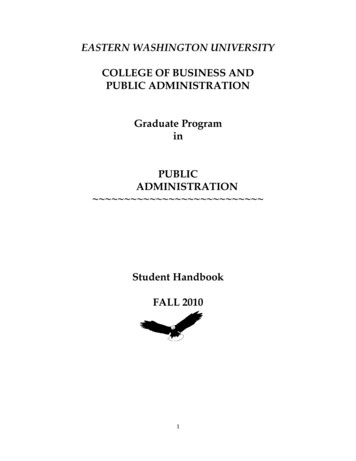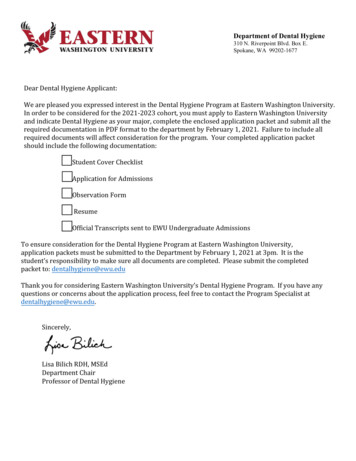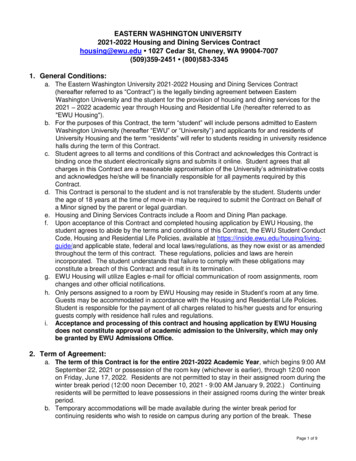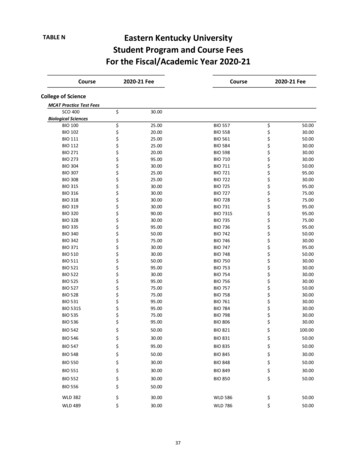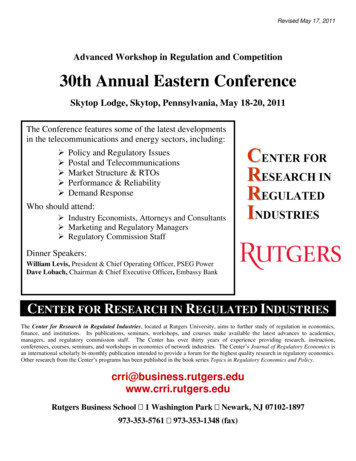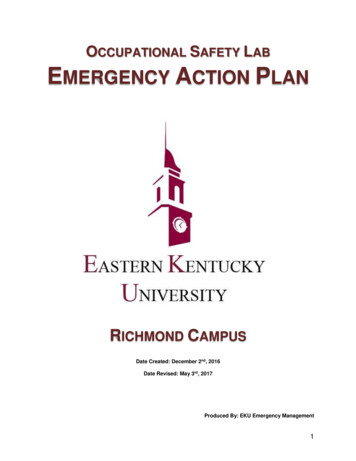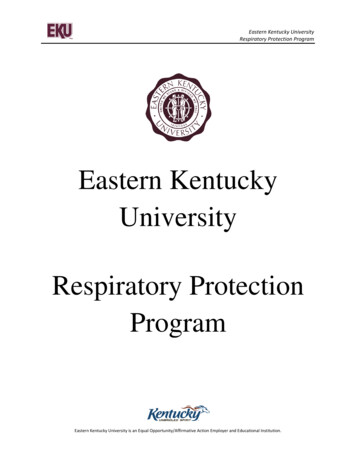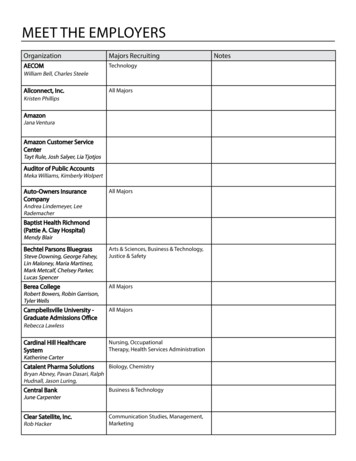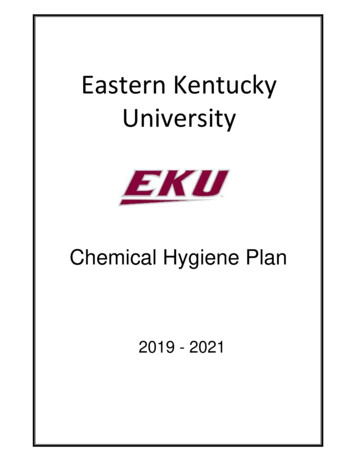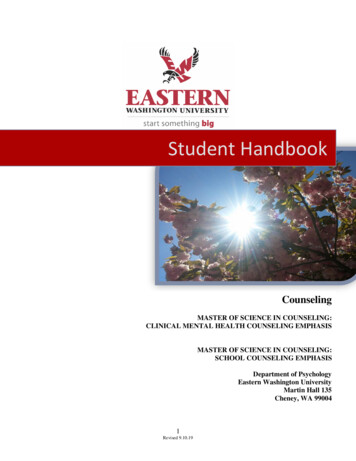
Transcription
Student HandbookCounselingMASTER OF SCIENCE IN COUNSELING:CLINICAL MENTAL HEALTH COUNSELING EMPHASISMASTER OF SCIENCE IN COUNSELING:SCHOOL COUNSELING EMPHASISDepartment of PsychologyEastern Washington UniversityMartin Hall 135Cheney, WA 990041Revised 9.10.19
Welcome to the Counseling Program at EasternWashington University!This handbook is designed to provide you, the master’s level student, with a comprehensiveoverview of the Counseling Program, our policies and procedures, and your rights andresponsibilities. If you have questions about our program, you will likely find clear and thoroughanswers in the following pages. Please review the document carefully, keep it readily accessible,and consult it often. If you have questions after reading through the handbook, please contactyour assigned faculty advisor or the Program Director, Dr. Keely Hope.This handbook serves as a supplement to the Graduate Catalog. It is your responsibility asstudent or prospective student to become familiar with the contents of the Graduate Catalog(available online at https://www.ewu.edu/academics/catalog).To confirm that you have read this handbook and have understood the responsibilities, policies,and procedures outlined herein, please sign the Agreement Contract at the end of this handbookand submit it to Dr. Keely Hope.This Handbook is updated once per year and is available online, along with a number of otherresources.Best wishes in your personal and professional pursuits!The Counseling FacultyDr. Keely HopeDr. Karrie SwanMs. Cynthia Messier2Revised 9.10.19
TABLE OF CONTENTSWELCOME TO THE COUNSELING PROGRAM AT EASTERN WASHINGTON UNIVERSITY! . 2TABLE OF CONTENTS . 3INTRODUCTION TO THE COUNSELING PROGRAM . 6MISSION & VISION . 6COUNSELING MASTER’S DEGREE SPECIALTY AREAS. 7COUNSELING PROGRAM CORE FACULTY. 8BEGINNING A MASTER’S DEGREE . 9STUDENT ORIENTATION . 10MASTER’S DEGREE CURRICULUM & OBJECTIVES. 11PROGRAM OBJECTIVES AND STUDENT LEARNING OUTCOMES . 11CORE CACREP CURRICULUM & OBJECTIVES . 12CACREP SECTION 2. 12PROFESSIONAL COUNSELING ORIENTATION AND ETHICAL PRACTICE . 12SOCIAL AND CULTURAL DIVERSITY . 12HUMAN GROWTH AND DEVELOPMENT . 13CAREER DEVELOPMENT. 13COUNSELING AND HELPING RELATIONSHIPS . 13GROUP COUNSELING AND GROUP WORK . 14ASSESSMENT AND TESTING . 14RESEARCH AND PROGRAM EVALUATION . 15CLINICAL MENTAL HEALTH COUNSELING SPECIALTY . 161. Foundations . 162. Contextual Dimensions . 163. Practice . 164. Clinical Instruction . 17SCHOOL COUNSELING SPECIALTY . 181. Foundations . 182. Contextual Dimensions . 183. Practice . 184. Clinical Instruction . 19Residency-Level Benchmarks for School Counselors . 19ATTAINMENT OF STUDENT KNOWLEDGE AND SKILL . 19ASSESSMENT OF CANDIDATE PROGRESS AND STUDENT LEARNING OUTCOMES . 20POLICIES AND PROCEDURES . 20ACADEMIC POLICIES . 20Advancement to Master's Degree Candidacy . 20RETENTION POLICY . 21SATISFACTORY PROGRESS POLICY . 22INCOMPLETES . 23EXIT OR GRADUATION REQUIREMENTS . 23COMPREHENSIVE EXAM . 24NATIONAL COUNSELOR EXAMINATION AND PRAXIS . 25ENDORSEMENT POLICY . 25WASHINGTON STATE COUNSELOR CREDENTIALING STANDARDS . 263Revised 9.10.19
WASHINGTON STATE ESA STANDARDS & BENCHMARKS . 26STUDENT REMEDIATION AND GUIDANCE POLICY . 271. Meeting to Identify the Problem . 272. Creation of Professional Development Plan . 273. Recurring and/or Severe Problems . 284. Removal or Dismissal from the Program . 28DUE PROCESS PROCEDURES . 29APPEALS PROCEDURE . 29UNIVERSITY & DEPARTMENT POLICIES . 29DIVERSITY AWARENESS AND ACTION PLAN . 29PROFESSIONAL DISPOSITIONS POLICY . 30EVALUATION OF PROFESSIONALISM . 30SOCIAL MEDIA GUIDANCE . 31WRITTEN WORK POLICY . 31SEXUAL HARASSMENT POLICY . 31LEAVE OF ABSENCE . 32RETURNING TO SCHOOL AFTER A LEAVE OF ABSENCE . 33STUDENT EVALUATION OF COURSES AND INSTRUCTION . 33POSITION ATTAINMENT POLICY . 33CLINICAL EXPERIENCES AND POLICIES . 34STATEMENT OF LIABILITY AWARENESS . 34REQUIRED COUNSELING EXPERIENCES . 34TIMELINE FOR CLINICAL COURSEWORK IN COUNSELING . 35CLINICAL EXPERIENCES AND POLICIES . 36PRACTICUM POLICY . 36INTERNSHIP POLICY . 36STUDENT FAILURE TO ACQUIRE INTERNSHIP PLACEMENT . 38PERSONAL AND PROFESSIONAL CONSIDERATIONS & POLICIES . 40STUDENT PROFESSIONAL DEVELOPMENT AND SELF-DISCLOSURE STATEMENT . 40PERSONAL GROWTH/ADJUSTMENT POLICY . 40PROFESSIONAL COUNSELING ORGANIZATIONS . 42AFFILIATE AND OTHER PROFESSIONAL ORGANIZATIONS . 43CHAPTER OF CHI SIGMA IOTA . 43SCHOLARSHIPS. 44THE WALT POWERS SCHOLARSHIP IN COUNSELING. 45Criteria for the Walt Powers Scholarship . 45THE ALAN AND JANNA BASHAM SCHOLARSHIP . 45Criteria for the Scholarship . 46APPENDIX A: PROFESSIONAL COUNSELING COMPETENCIES . 47APPENDIX B: STUDENT VERIFICATION OF HANDBOOK . 514Revised 9.10.19
You are expected to read, use, and comply with the policies and procedure that thiscomprehensive handbook contains. Read it and refer to it often. It is your resource and guidethroughout the program.5Revised 9.10.19
INTRODUCTION TO THE COUNSELING PROGRAMMISSION & VISIONThe Counseling Program at Eastern Washington University is committed to the selection,training, supervision, and professional success of counseling students, in keeping with the highstandards established by the Council for the Accreditation of Counseling and RelatedEducational Programs (CACREP). As a regional teaching university, EWU has a proud historyof providing education to a high percentage of first-generation college students, often fromunder-represented and lower socioeconomic communities, a tradition which the Counselingprogram maintains. We strive to prepare candidates to be ethical, culturally competent,theoretically sound and clinically skilled practitioners. Thus, counselor training occurs in alearning community that is challenging andsupportive, academically stimulating, honorsdiversity, and intentionally focuses on bothskill development and personal growth of thecounselor-in-training. In this way, Counselingfollows the EWU mission of expandingopportunities for personal transformationthrough excellence in learning.ABOUT THE PROGRAMThe Counseling Program is housed in the Department of Psychology in Martin Hall at theCheney, Washington campus. The program has achieved and maintained accreditation throughthe Council for Accreditation of Counseling and Related Educational Programs (CACREP) since1989. Our program received the Innovative Counselor Education Program Award from theWestern Association for Counselor Education in 2016.6Revised 9.10.19
COUNSELING MASTER’S DEGREE SPECIALTY AREASFor individuals seeking to become counseling professionals, the Master of Science (MS) degreesare offered in the following tracks of study. Students receive an endorsement for the track thatthe graduate has completed.Clinical Mental Health CounselingEWU students enroll in a 94-quarter-hour track that is currently accredited by CACREP. Thispath leads to a Master of Science (MS) degree and prepares graduates to counsel in clinicalmental health settings such as mental health clinics, private counseling agencies, drug abusetreatment centers, child counseling clinics, family counseling centers, and private practice. Thistrack meets the educational requirement for Licensure as a Licensed Mental Health CounselorAssociate in Washington.School CounselingThe 94-quarter-hour track is currently accredited by CACREP. This path leads to a Master ofScience (MS) degree and prepares graduates to counsel children and adolescents in bothelementary and secondary school counseling settings. The program area meets the educationalrequirement for Certification as a School Counselor in Washington (ESA).7Revised 9.10.19
COUNSELING PROGRAM CORE FACULTYA full-time faculty member’s job generally consists of three parts: teaching, research andprofessional service to the university and community. A core faculty member is one who’sprimary teaching responsibility is in the counseling program. Each core faculty member alsoholds a doctorate in Counseling. A counselor educator typically enters the field as an AssistantProfessor. After an established length of time and demonstration of quality work, the AssistantProfessor is promoted to Associate. After a further length of time and demonstrated quality ofwork, the Professor is promoted to Full Professor. Full time lecturers are regular facultymembers whose assignments are in teaching and service.Name, Degree, PositionDegree FromTeaching AreasResearchInterests/Specialty AreasKeely Hope, PhDUniversity of FloridaAssociate Professor,Clinical Mental HealthCrisis Intervention,CounselingSuicide Prevention,Program DirectorKarrie Swan, PhD,Attachment theoryUniversity of North TexasSchool CounselingPlay Therapy, FilialAssistant Professor,Therapy, SchoolSchool CounselingCounselingCoordinatorCynthia MessierOregon State UniversityCore Counseling areasAdverse ChildhoodExperiences and theLecturerimpact on adulthood8Revised 9.10.19
BEGINNING A MASTER’S DEGREEADMISSIONApplicants seeking admission to the Counseling Program should be aware that the WashingtonDepartment of Health and The Office of Superintendent of Public Instruction run criminalhistory checks on all applicants for licensure or certification. In Washington, certification isrequired to counsel in public schools; licensure is required to counsel outside the public school orreligious setting. An applicant with a criminal background who seeks professional credentialsshould contact the appropriate Board prior to enrollment in the program to determine eligibilityfor certification and/or licensure.Admission to the Counseling Graduate Program at Eastern Washington University requires thefollowing submission to the Program Faculty and the Office of Graduate Studies:1. Application and application fee2. Personal Statement given the following prompts:a. How have your life experiences influenced your decision to pursue a career incounseling?b. Once you complete this degree, where do you see yourself working and with whatpopulation (types of clients)?c. During your graduate education you will be exposed to people whose experiencesand opinions are different from your own. How are you prepared to dealeffectivelywith these people?d. As a CACREP accredited program, we strive to provide the community withleaders. How do you see yourself providing leadership within your communityupon completion of this program?3. Transcripts for GPA verification4. Three recommendation letters5. Work or Volunteer Experience6. GRE ScoresOnce applications are reviewed, the admissions committee may invite c
The Counseling Program at Eastern Washington University is committed to the selection, training, supervision, and professional success of counseling students, in keeping with the high standards established by the Council for the Accreditation of Counseling and Related Educational Programs
